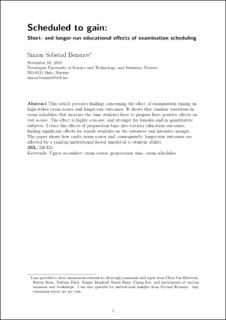| dc.contributor.author | Bensnes, Simon Søbstad | |
| dc.date.accessioned | 2020-04-20T08:00:10Z | |
| dc.date.available | 2020-04-20T08:00:10Z | |
| dc.date.created | 2020-01-13T10:08:38Z | |
| dc.date.issued | 2019 | |
| dc.identifier.citation | The Scandinavian Journal of Economics. 2019, 1-32. | en_US |
| dc.identifier.issn | 0347-0520 | |
| dc.identifier.uri | https://hdl.handle.net/11250/2651612 | |
| dc.description.abstract | In this paper, I present findings concerning the effect of examination scheduling on high‐stakes exam scores and longer‐run outcomes. I show that random variations in examination schedules, which increase the time students have to prepare, have positive effects on exam scores. The effect is highly concave, and stronger for females and in quantitative subjects. I trace the effects of preparation time into tertiary education outcomes, finding significant effects for female students on the extensive and intensive margins. I show how easily exam scores and, consequently, longer‐run outcomes are affected by a random institutional factor unrelated to student ability. | en_US |
| dc.language.iso | eng | en_US |
| dc.publisher | Wiley and The editors of The Scandinavian Journal of Economics 2019. | en_US |
| dc.title | Scheduled to Gain: Short- and Longer-Run Educational Effects of Examination Scheduling | en_US |
| dc.type | Peer reviewed | en_US |
| dc.type | Journal article | en_US |
| dc.description.version | acceptedVersion | en_US |
| dc.source.pagenumber | 1-32 | en_US |
| dc.source.journal | The Scandinavian Journal of Economics | en_US |
| dc.identifier.doi | 10.1111/sjoe.12363 | |
| dc.identifier.cristin | 1771102 | |
| dc.description.localcode | Locked until 27 March 2020 due to copyright restrictions. This is the peer reviewed version of an article, which has been published in final form at https://doi.org/10.1111/sjoe.12363. This article may be used for non-commercial purposes in accordance with Wiley Terms and Conditions for Self-Archiving. | en_US |
| cristin.ispublished | true | |
| cristin.fulltext | postprint | |
| cristin.qualitycode | 2 | |
